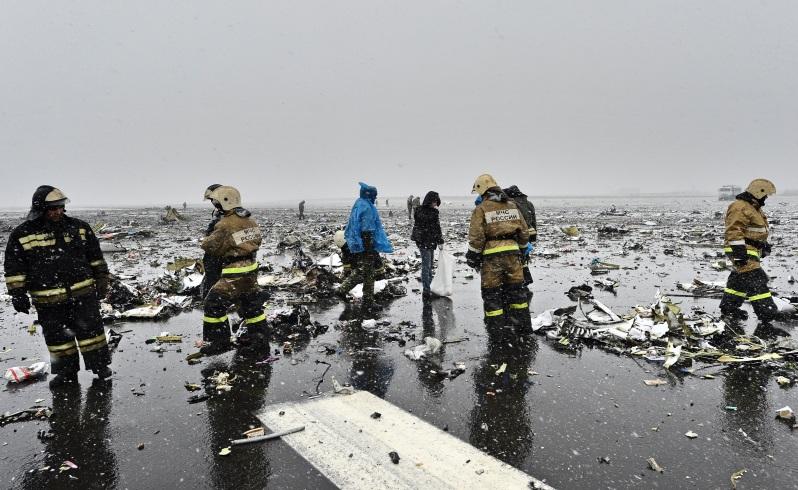Pilot fatigue a factor in FlyDubai crash?
25 March, 2016
5 min read
By joining our newsletter, you agree to our Privacy Policy


FlyDubai’s workplace practices have come under intense scrutiny after a former senior pilot, turned whistle-blower, spoke up about the airline’s rosters in turn blaming them for the crash of Flight FZ981 at Rostov-on-Don on March 19th that killed all 62 aboard the Boeing 737.
The pilots had aborted their second attempt at landing and were climbing through 1550m at 370km/hr when their 737 suddenly - and without warning - plummeted into the airport disintegrating in a fireball beside the runway.
This week a former captain told the website RT.com that at Flydubai lack of sleep for flight crew was a major issue and he had warned management that “there would be an accident because of pilot fatigue.”
The five-year old aircraft was operating flight FZ981 from Dubai to Rostov-on-Don in southern Russia and the pilots had spent 2.5 hours in a holding pattern waiting for bad weather to clear before attempting a second landing.
Many safety experts are already pointing the finger at fatigue and disorientation as factors.
On May 29th last year AirlineRatings.com in a special report called “Stressed Out” warned the industry of the massive pressures building on pilots of low cost airlines.
READ AirlineRatings special report on pilot fatigue
Yesterday the BCC claimed, citing colleagues, that the captain of the FlyDubai jet which crashed was due to leave the airlinestating fatigue as the reason.
Pilots speaking anonymously to the BBC say fatigue was a contributory factor in the accident - claims that FlyDubai says relate to "confidential information" the BBC said.
The BBC added that the pilots at the airline claim their colleagues are at "significant and obvious risk" from fatigue. One of the sources has already resigned and another says he will quit.
The three FlyDubai staff members told the BBC that the captain, Cypriot Aristos Sokratous, had already resigned and was serving out his three-month notice, stating fatigue and lifestyle as his main reasons for leaving.
"This crash was very close to home," a FlyDubai pilot told the BBC. "I don't want to speculate on what caused the crash, but I think that fatigue must have been a contributory factor. I'm also not surprised it happened.
"Crew are overworked and suffering from fatigue. It is a significant risk.
"Staff are going from night to day shifts without enough rest in between. I would say 50% of the airline's workforce are suffering from acute fatigue.
"I raised it with a senior member of staff at the airline who said 'we don't have a fatigue issue at FlyDubai'."
"Approximately 25 pilots out of 600 have resigned since the beginning of the year. From my understanding, most have cited fatigue, rosters and quality of life."
Another pilot who spoke to the BBC said he and colleagues had also raised the issue of fatigue with the airline's management and he had admitted falling asleep on the flight deck on one occasion due to exhaustion. He said he is going to resign from the airline.
"The degradation in performance is noticeable," the second pilot said.
"I have fallen asleep at the controls due to fatigue. I also didn't have full mental capabilities on approach, which is incredibly serious.
"I admitted it and raised it with senior staff but nothing was done about it.
In a statement to AirlineRatings.com the airline said: "For FlyDubai the safety and welfare of our flight crew and cabin crew is of primary importance. The whole aviation industry is heavily regulated.
"We strictly follow authorised flying duty time regulations in compiling duty rosters, with special attention paid to the variables which affect our crews including report times, previous duty and the number of days off.
"If a member of flight crew feels that, for whatever reason, they have not been able to get enough rest before starting a shift, our Safety Management Systems (SMS), encourages pilots to declare themselves unfit to fly."
But another pilot told AirlineRatings and RT.com that the problem was the timing of the shifts.
He argued that the crew often does not have enough time for sleep readjustment.
“Everybody at the company has these dangerous shifts from day flight to night flight, and then back to a day flight, and then back to a night flight, and it has definitely been a big issue for a long time,” he said.
“The way that Flydubai builds the schedules does not account for circadian rhythm and they do not allow pilots to get the right amount of rest, or the proper rest before a flight, and that is exactly what both of these pilots were, the situation that they were in, for sure,” the pilot added.
Separately AirlineRatings.com has learned from sources in Washington DC that a number of pilots have resigned from FlyDubai after the accident.
The source claimed that the other issue was subtle pressure not to divert in bad weather as it would disrupt the airline’s tight schedules.
Get the latest news and updates straight to your inbox
No spam, no hassle, no fuss, just airline news direct to you.
By joining our newsletter, you agree to our Privacy Policy
Find us on social media
Comments
No comments yet, be the first to write one.


